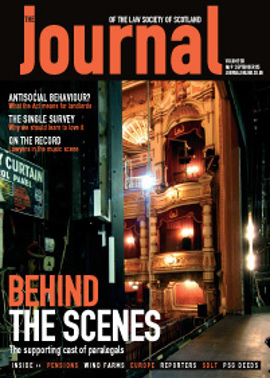Scottish Solicitors Discipline Tribunal

IAN WILSON LEITCH
A complaint was made by the Council of the Law Society of Scotland against Ian Wilson Leitch, solicitor, Messrs Gibson Kerr & Co, 46 India Street, Edinburgh (“the respondent”). The Tribunal found the respondent guilty of professional misconduct in cumulo in respect of his breaches of rules 4, 6, 8 and 24 of the Solicitors (Scotland) Accounts etc Rules 2001, his delay and failure to record standard securities, his failure to present to the Keeper of the Land Register discharges of standard securities after the loans due had been paid in full and his failure to present timeously and promptly, conveyancing deeds for stamping. The Tribunal censured the respondent and directed in terms of section 53(5) of the Solicitors (Scotland) Act 1980 that with effect from 7 February 2005, any practising certificate held or issued to the respondent shall be subject to such restriction as will limit him to acting as a qualified assistant to such employer or successive employers as may be approved by the Council or the Practising Certificate Committee of the Council of the Law Society of Scotland and that for an aggregate period of at least 10 years and thereafter until such time as he satisfies the Tribunal that he is fit to hold a full practising certificate.
The Tribunal’s decision was appealed to the Court of Session but the appeal was dismissed.
The Tribunal was very concerned with regard to the number of breaches of the Money Laundering Regulations, especially in connection with one particular client. The various breaches of the Accounts Rules coupled with the delay in recording deeds show that the respondent is not fit to continue as a sole practitioner. The Tribunal considered that the public interest would be protected by a restriction on the respondent’s practising certificate for a period of 10 years. At the end of that period it will be for the respondent to come back to the Tribunal, if he so wishes, and show that he has gained the necessary experience to satisfy the Tribunal that he is able to take on the responsibility of being a principal in private practice. The Tribunal ordered the restriction to run from 7 February 2005 to allow the respondent time to dispose of his practice.
ALEXANDER GILMOUR MALCOLM
A complaint was made by the Council of the Law Society of Scotland against Alexander Gilmour Malcolm, solicitor, 23 Tarvit Drive, Cupar, Fife (“the respondent”). The Tribunal found the respondent guilty of professional misconduct in respect of his acting in a dishonest fashion by contriving a number of false reports to his clients and providing his clients with false information which he knew to be untrue, all contrary to article 7 of the Code of Conduct for Solicitors Holding Practising Certificates issued by the Law Society of Scotland in 1989. The Tribunal censured the respondent and directed in terms of section 53(5) of the Solicitors (Scotland) Act 1980 that until 11 August 2007, any practising certificate held or to be issued to the respondent shall be subject to such restriction as will limit him to acting as a qualified assistant to such employer or successive employers as may be approved by the Council of the Law Society of Scotland or the Practising Certificate Committee of the Council of the Law Society of Scotland.
A joint minute was lodged in which the facts, averments of duty and averments of professional misconduct were admitted. The Tribunal found that the respondent’s conduct was not in accordance with the basic principles of honesty. He misled his clients by contriving a number of statements which he intimated to them as being true when they were not. This conduct brings the profession into disrepute and is not the kind of conduct the public would expect of a solicitor. The Tribunal however took account of the fact that the respondent had been in practice for 28 years and had never had any previous difficulties, and had co-operated with the Law Society and entered into a joint minute. The respondent seemed genuinely contrite with regard to what had happened and had straightforwardly explained the circumstances to the Tribunal. The respondent had probably paid his clients a sum in excess of what had actually been required. The Tribunal considered censuring the respondent, but due to the serious view the Tribunal takes of any kind of dishonesty, the Tribunal felt that it was also necessary to impose a restriction on the respondent’s practising certificate to ensure the protection of the public. The Tribunal felt it was appropriate to impose this restriction until 11 August 2007, when the respondent’s sequestration is due to expire.
WILLIAM DUNCAN COPELAND
A complaint was made by the Council of the Law Society of Scotland against William Duncan Copeland, solicitor, Copeland & Co, solicitors, 43 Quarry Street, Hamilton (“the respondent”). The Tribunal found the respondent guilty of professional misconduct in respect of his failure to implement a formal undertaking issued by him in terms of a letter of obligation and his failure to respond timeously, openly and accurately to the reasonable enquiries made of him by fellow solicitors and by the Society. The Tribunal censured the respondent and directed in terms of section 53(5) of the Solicitors (Scotland) Act 1980 that for a period of five years from 15 August 2005 any practising certificate held or issued to the respondent shall be subject to such restriction as will limit him to acting as a qualified assistant to such employer as may be approved by the Council or the Practising Certificate Committee of the Council of the Law Society of Scotland.
The Tribunal was concerned by the respondent’s failure to implement the letter of obligation. Settlements of all conveyancing transactions are dependent on such obligations. As has been previously stated by the Tribunal it is essential for the smooth working of the conveyancing system that solicitors co-operate fully. The Tribunal took account of the fact that the respondent had taken steps to wind down his business and had co-operated in the proceedings before the Tribunal and entered into a joint minute. The Tribunal also noted that the respondent had given an undertaking to the Tribunal not to take on any new business. In the circumstances the Tribunal was satisfied that a restriction on his practising certificate commencing on 15 August 2005 for a period of five years would be sufficient to ensure protection of the public and would allow the respondent time to conclude the winding up of his business.
In this issue
- Moving in society
- Pots and kettles
- Unseen force
- Licence to let?
- The cost of a puff
- Select band
- Cross-border disputes: a practical way forward?
- No hiding place
- Safe as houses?
- Close connection
- Another string to the bow
- The ultimate sanction?
- A right and its exercise
- In good company
- Out of bounds
- Scottish Solicitors Discipline Tribunal
- Website reviews
- Book reviews
- The single survey: why it should be supported
- Drafting deeds of conditions - a real burden?
- SDLT online service






